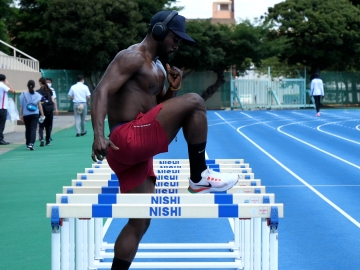A symposium on female athlete health was held on Saturday, September 22, 2018 at the Ibuka Auditorium, Waseda University.
At the symposium, the following guest speakers spoke on the weight management and diet for female athletes, referring to their researches, the importance of weight management, and other sports nutrition matters from professional aspects: Dr. Rafaella Spada, a member of the Italian National Olympic Committee; Fumie Suguri, figure skating choreographer; Norikazu Hirose, professor of Sport Sciences at Waseda University; Loredana Torissi, dietician for the Italian National Olympic Committee; Kuniko Moto, Graduate School of Sport Sciences at Waseda University; Emi Kondo, researcher, Sports Nutrition Group, Sports Medical Center at Japan Institute of Sports Science.
Hirotaka Matsuoka, Professor, Faculty of Sport Sciences of Waseda University gave an opening speech. “We are hosting the Italian national team, who will have a pre-Olympic training camp at our Tokorozawa Campus for the Tokyo 2020 Olympic Games. We have two guest speakers with us today from the Italian Olympic Committee: Rafaella Spada and Rorenada Torissi. For this symposium, they will speak on the method of weight management for the Italian athletic team members and nutrition support.” He added, “This symposium is held as part of the Japan Sports Agency’s development and support project for female athletes.”
Following the opening speech, Dr. Rafaella Spada gave a keynote speech on nutrition support for top Italian athletes. “The Sports Medical Committee of Italy provides a range of support to athletes as well as information and advice to sports doctors, coaches, and trainers. Sports coaches and trainers must be able to give advice–not mere advice but target-focused advice. We are responsible for developing human resources who can give such advice.” Regarding diet for athletes, she said, “Appropriate intake of nutrition is directly related to the building of a strong body that can compete on the global stage. For this reason, the committee has recently started to look at traditional dietary habits in the world as well as our own. We share much in common with Japan in terms of diet; both Japanese and Italians take in protein and other abundant nutrition from beans like soy, which are also good for building the body of an athlete. The key to maintaining good physical condition is to eat a variety of foods and take in an abundance of nutrition, considering the quality, quantity, and timing of intake.”
The next speaker was Ms. Fumie Suguri, who is an ex-figure skater and figure skating choreographer. Ms.Suguri said, “An athlete is required to maintain good spirit, technique, and physical condition to achieve good results. Among them, good physical condition is built on good diet. Female athletes, in particular, need to have a daily diet, considering childbirth and life after retiring as an athlete. But younger athletes tend to skip meals, eat a poor diet, or reach for unhealthy food options in an effort to lose weight. It is the role of athletic trainers and supporters to redirect their eating habits toward healthy diet. First of all, athletes will need to change their attitude toward diet. Continued intake of appropriate food makes healthy athletes and build a body that can compete in high-level games and competitions.”
The symposium, which was then led by Motoko Taguchi, professor of Sport Sciences at Waseda University as MC, moved on to speeches by four guests on the theme “weight management for female athletes,” followed by a panel discussion.
First, Prof. Norikazu Hirose, who is also an athletic trainer for the Japan women’s national football team said, “Weight data management is important for understanding the athlete’s condition. What’s important in implementing weight management programs is to analyze the athlete’s condition both subjectively and objectively. Body weight or body fat is just an objective measurement. It is necessary to holistically review subjective data as well, such as the athlete’s physical condition, sleeping hours, and physical features in order to find solutions. I want trainers responsible for managing the athlete’s condition to address each athlete case personally and individually through discussion with them to ensure that they can choose appropriate diet.
The next speaker, Ms. Loredana Torissi, said to the effect, “Athletes who are classified by weight are more careful about weight control than those who are not. Trainers responsible for weight management must determine the amount of food intake for each athlete by looking games ahead. This does not mean reducing some of the key food groups like grains, proteins, and vegetables. The trainers need to give advice to athletes as needed to reduce junk food and alcohol, to manage to eliminate food or drink unnecessary to the body, and to take in balanced nutrition.
The third speaker was Ms. Kuniko Moto, a qualified sports dietitian, said, “There are a lot of female university student athletes who have an unbalanced diet like eating only protein food as main dish or never taking in carbohydrate. I teach those students the importance of developing a standard diet. Some athletes have no idea what the standard diet is all about, and others do not have time to cook. To those athletes, I recommend ingredients that can be easily found or stocking of ingredients. For us to provide appropriate weight management support, we must continue assessment to constantly ensure current condition. Athletes have to consult professionals, such as doctors, trainers, and qualified sports dietitians, whenever necessary, which will lead to more appropriate weight management and physical conditioning.
Ms. Emi Kondo, a qualified sports dietitian, said, “When an athlete needs to lose weight, it is generally recommended that the athlete take time in doing so as it will help burn fat faster and lead to better performance, but in cases when little time is left until the next competition, athletes may need to lose weight under extreme calorie restriction. Female athletes who have lost weight rapidly tend to disrupt the normal balance of hormones, experiencing abnormal sensitivity to cold temperatures and irregular menstruation. Athletes should ideally maintain their target weight instead of losing weight over a short period of time. We, weight management trainers, must discuss methods of weight loss with athletes based on scientific grounds to determine a target weight and a plan for reaching it and provide a guide on arrangement of food intake.

At the panel discussion following their speeches, Prof. Hirose explained as to how to determine an athlete’s target weight, “We will determine target weight considering each athlete’s physical conditions and circumstances. As with injured athletes, we set target weight considering the athletes’ conditions before injury when they performed best.” Dr. Spada said, “In Italy, we determine target weight to maintain a certain percentage of body fat by accurately measuring body organization and structure, while at the same time ensuring that weight itself is kept above the lowest permissible level, of course.”
As to dietary advice to athletes, Prof. Hirose said, “We tell them precisely about both positive effects and negative effects, and explain accurately how a change in one’s diet will affect one’s performance and other team members.” Ms. Moto added, “Diet is part of one’s private life. We carefully and attentively discuss diet with each athlete.”
Prof. Taguchi concluded the panel discussion by saying, “It is important to support athletes through appropriate assessment without being obsessed with numeric data. Learning other countries’ approaches and cultures will give us an opportunity to revisit our own activities of weight management. We will also need to be positioned to communicate our own activities and achievements.” The symposium ended with her conclusion.






